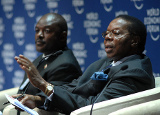Burundi Prepares for Crucial Poll
By Ioannis Gatsiounis for ISN
Burundi’s 28 June presidential elections will be a crucial test for the country’s incipient democracy, and how the republic responds to back-and-forth accusations and how the ruling parties and the opposition decide to settle things could reverberate well beyond Burundi’s borders. So far, developments are not promising.
On 1 June, five opposition presidential candidates announced they would boycott the poll, saying it would be rigged. Opposition leader Agathon Rwasa, head of the opposition Forces for National Liberation party – a former rebel movement – is among the boycotters. He is a main rival to President Pierre Nkurunziza, and he and four other opposition candidates say the electoral commission failed to prevent fraud in last week’s district elections, and the same pattern will emerge in presidential elections later this month. This, despite the fact that international observers declared the local polls free and fair.
On 8 June, the country’s electoral commission announced that Nkurunziza would be the only candidate in the election, with his rivals officially out of the game. But even before that the incumbent was widely expected to win.
Regional security implications
Time and again over the past few decades the tiny landlocked country, among the world’s poorest, has proved critical to regional security. It has been a crossroads of illegal arms, a floodgate of refugees and even inadvertently helped spark the 1994 genocide in neighboring Rwanda.
Now it finds itself the first of four East African Community countries to go to the polls over the next 10 months, and some observers fear that what happens here could set the tone for those elections.
“If Burundi’s elections go well, it could serve as an example to be leveraged by other countries,” Charles Petrie, UN executive representative for Burundi, told ISN Security Watch. Of course, the reverse is also a possibility.
Burundi’s first crucial test came last week in the form of district elections, which Nkurunziza’s CNDD-FDD party won in a near landslide, with 64 percent of the vote. The polls passed pretty much without a hitch, external pageaccording to EU monitorscall_made. Political parties that win at the district level are seen to stand a strong chance of winning the presidency.
But incidents of street violence and intimidation were reported in the months leading up to poll, with youth wings of political parties external pageclashing on several occasionscall_made. Still, some observers noted that these were isolated cases, and a far cry from violence of the past.
The CNDD-FDD and the main opposition party, the NFL, are former rebel groups. The latter did not agree to lay down its arms until late 2008. Both are suspected of still possessing sizeable arms caches, and illicit light arms left over from the civil war days still circulate in the public. An external pageestimated 80 percentcall_made of households in the capital and larger provinces possess small arms.
Given their backgrounds, a key concern now is how the opposition parties will manage their setbacks.
Following last Monday’s elections, opposition parties contested international observers’ findings and accused the CNDD-FDD of massive fraud. But they and their supporters find little redress in what they allege is a compromised judiciary, and some analysts feel this could lead them to take the law into their own hands.
Fabien Nsengimana, director of the Burundi Leadership Training Program, told ISN Security Watch that the opposition may try to exploit factions within the CNDD-FDD and this could have destabilizing effects on the country.
There is also a chance that race could rear its ugly head again. The civil war found Tutsis and Hutus vying for political and economic power, and claiming some 300,000 lives in the process.
The country has made great strides in reconciliation since a power-sharing agreement, the Arusha Accords, was finalized in 2001, instituting quotas for both races in the police, military and other key state bodies. Today, the president is Hutu and four of his 12 ministers are Tutsi, with the main political divides pitting Hutus against Hutus.
But FNL leader Agathon Rwasa was reportedly heard recently on the campaign trail claiming that the FNL was the “real Hutu party.” With his back against the wall, Rwasa could resort to race rhetoric to win votes.
In need of good governance
But the biggest threat to stability may boil down to how the country is governed after the elections.
Nkurunziza has implemented free primary school education for children under five and free health care to pregnant women. But a shortage of resources, including qualified doctors and teachers, has impaired implementation.
Corruption has reportedly worsened during Nkurunziza’s presidency - to the point that some donor nations are said to be mulling the option of withdrawing aid. With a scarcity of land and the bulk of Burundians’ livelihoods coming from subsistence farming, land disputes make up a large chunk of court cases in the inefficient and compromised judicial system.
After years of civil war, many of the country’s prospective political leaders are from the bush, with few intellectuals and technocrats among them. Indeed, none of the main political parties has offered much in the way of concrete political and economic platforms. Nkurunziza has maintained some support through his populist touch, which has found him dawning overalls and planting trees in villages, and waiting his turn in a queue before casting his ballot during district elections.
Most Burundians are tired of political unrest. But democracy, a word that implies empowerment and opportunity, comes with expectations, and Burundi’s next president will be called on to deliver above and beyond what Nkurunziza has managed in the last five years.
One hears often that Burundi will benefit when the East African Community adopts a common market next month, but the claim is uttered more wishfully than confidently, with few if any specifics accompanying it.
As such, even if Burundi gets through the election run without major incident, cautious optimism is likely to remain the collective mood for some time.

